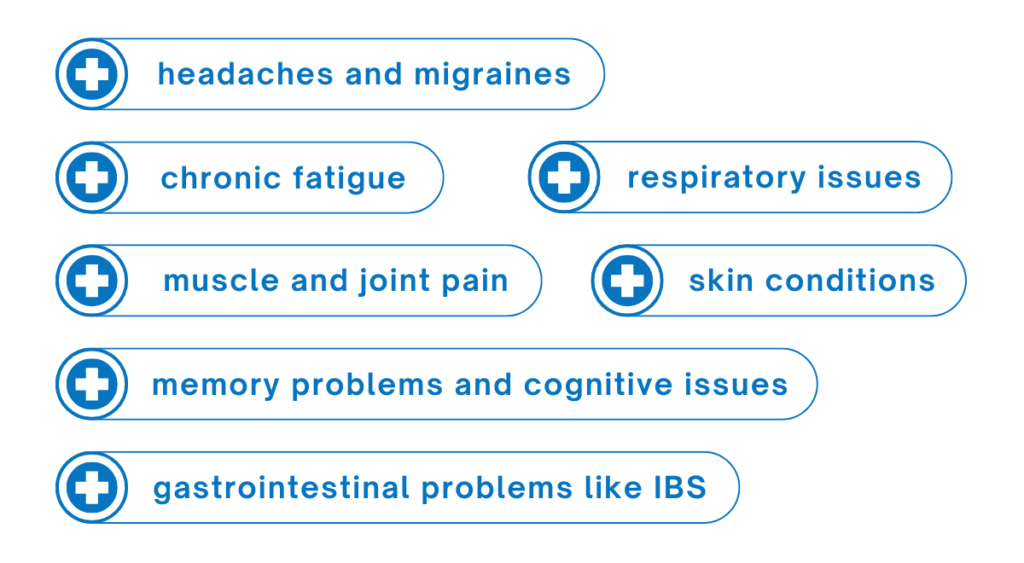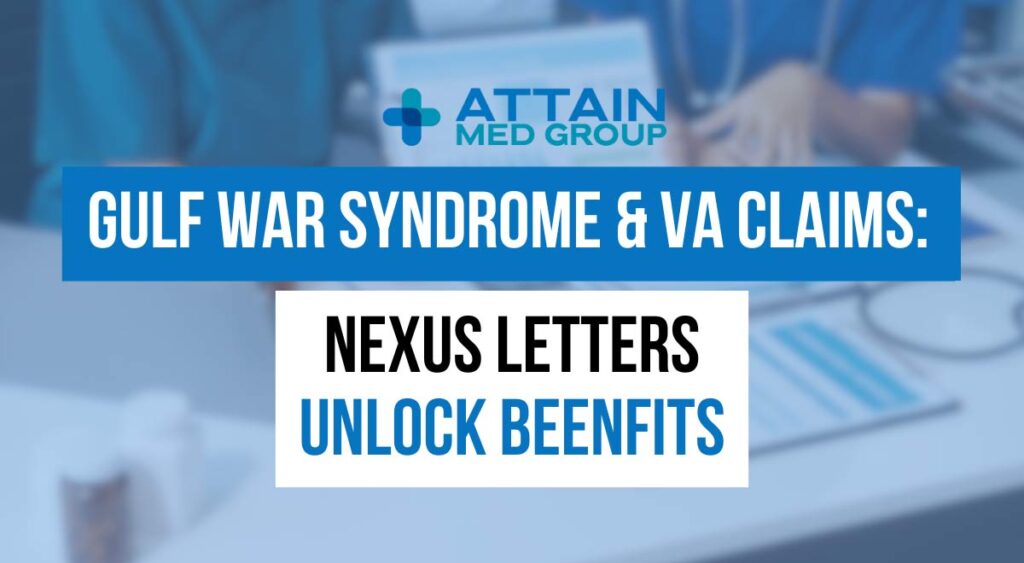Did you serve in the Gulf War and now face a cluster of baffling, persistent health issues? If you are, you are likely not alone. The VA recognizes that Gulf War veterans face a set of health challenges, often grouped under the umbrella of Gulf War Syndrome. Proving a service connection for these conditions can be tough, which is where understanding how a nexus letter can help is useful.
What if you could strengthen your claim and get the disability benefits you deserve? Many veterans find that a well-crafted nexus letter is useful when trying to show how your military service connects to your health problems. Let’s explore how a nexus letter can help with your Gulf War Syndrome & VA claims.
Understanding Gulf War Syndrome
Gulf War Syndrome, also known as Gulf War Illness, is a collection of chronic, medically unexplained symptoms affecting veterans of the 1990-1991 Persian Gulf War. The exact cause remains a mystery, which presents challenges for veterans.
Exposure to chemicals, environmental hazards, and preventative medicines given during service might have triggered these issues. It’s often a combination of factors rather than a single smoking gun, which makes proving your VA disability claim tougher. A nexus letter may be just what you need, so understanding the VA claims process is a great starting point.

Common Symptoms of Gulf War Illness
Veterans may experience a range of symptoms. It is important that your symptoms be recorded by doctors to present the complete picture. A healthcare provider can ensure they are properly documented.

These symptoms aren’t always easy to diagnose or link to a specific event during your war service. They can have a drastic impact on your daily life. For this reason, understanding how a nexus letter can help will give insights into maximizing your potential benefits.
Qualifying for VA Disability Benefits for War Syndrome
If you served in the Southwest Asia theater of operations during the Gulf War, the VA presumes that some illnesses are related to your military service. This means that for certain conditions, you don’t have to provide direct proof that your war service caused the illness. If this describes your condition, there are options that can help.
This is known as “presumptive service connection”. To be eligible for VA disability benefits, your symptoms must have appeared during your Gulf War war service or last for at least six months. Even with these presumptions in place from the 2022 PACT Act, documenting everything and strengthening your case is very important.
The Role of a Nexus Letter
So what is a nexus letter and why does everyone recommend having one?
A nexus letter is a statement from a medical professional. It clearly links your current medical condition to your war service. The letter serves as essential medical evidence, especially when your condition wasn’t diagnosed during war service or your Service Treatment Records (STRs) lack detailed information.
Why a Nexus Letter Matters for War Syndrome Claims
Here’s why a nexus letter can be so important for war syndrome claims:
- It strengthens your claim: A medical expert who understands your symptoms can connect those symptoms to your Gulf War war service.
- Addresses complex cases: Gulf War Syndrome can cause many symptoms, so the doctor who writes your VA nexus letter needs to know the VA claims process.
What a Strong Nexus Letter Includes
For a VA nexus letter to be helpful, it needs to include key elements.
- A review of your medical history, including any diagnoses and treatments.
- Details of your military war service, noting specific exposures or events.
- A clear medical opinion from the medical professional, using language like “at least as likely as not.” This phrase relates to VA’s requirements.
- Evidence that backs up their medical opinion, using medical records or studies.

How to Obtain a Strong Nexus Letter
Getting a strong VA nexus letter is vital. It is a process that may feel daunting, but let’s look at several things that can help with this process. You can work with a healthcare provider or an independent medical professional to get an independent medical opinion.
Finding the Right Medical Professional
Seek a doctor familiar with Gulf War Syndrome and the VA claims process. This could be a private physician, a VA doctor, or an independent specialist with an understanding of VA documentation.
Also for musculoskeletal conditions like joint pain, chiropractors can help. Their assistance is to supply a letter with coverage of the spine, joints, or muscles. However, sometimes you might need an outside specialist who can provide further insight on the connection of the joint pain to your military war service.
Providing Comprehensive Documentation
Give the doctor all your relevant records. This can include war service treatment records, VA medical records, and personal statements detailing events and symptoms. A well-organized set of treatment records can make the process smoother.
Make their job easier by helping them gain a deep understanding of your case. This information often can help with VA disability claim approval.
Understanding the “At Least as Likely as Not” Standard
The VA requires that a VA nexus letter state that it is “at least as likely as not” that your medical condition is related to your war service.
This is the VA’s standard of proof, and the doctor must clearly articulate the reasoning behind this medical opinion. A well-researched and articulated letter delivers VA essential medical evidence when you don’t meet the needed burden of proof. Your supporting evidence should tell the story of how your military war service caused the current disability.
Addressing Potential Challenges
Obtaining a strong VA nexus letter can come with obstacles. Here are things that will give you a better chance at getting approved, especially considering you aren’t required to turn one in. You might want to get an independent medical opinion from a qualified medical professional.
Doctors who aren’t familiar with VA claims are the most challenging hurdle. Some might be unwilling to write a VA nexus letter or simply don’t know what needs to be in the letter. Finding a medical professional who understands both Gulf War Illness and the VA claims process is key.

Filing Your VA Claim with a Nexus Letter
Ok, you now have that powerful Nexus Letter. But where and how do you file this claim? The VA’s requirements and how they look for specific verbiage can impact your claim. Once you have a firm understanding you should consider what can help.
Gathering Additional Supporting Evidence
Even with a VA nexus letter, gather additional evidence. Submit those to the VA.gov website. Use certified mail through the United States Postal Service, file it in person, or file it online with proper submission documents for receipt confirmation.
- War Service records showing where and when you served.
- Medical records documenting your symptoms and treatments.
- Lay statements from family and friends describing changes in your health.
What to Expect During the VA Claim Process
After filing your claim, the VA will review your records. Also, they will likely schedule you for a Compensation and Pension exam (C&P exam) to evaluate your medical condition. Be honest about how your Gulf War illness affects your life, even if it’s difficult to discuss.
Be ready to thoroughly discuss your symptoms. You must also highlight how they affect your daily life.
Document Symptoms. Be sure that symptoms such as memory, concentration, fatigue, vision, headaches, balance, gait, among other symptoms have an impact on activities of daily living (ADL). Have each one checked and recorded to have all medical conditions looked at.
Appealing a Denied Claim
Even with a VA nexus letter, claims can get denied; it’s sadly a fact. Should this occur, knowing your appeal choices is a must to potentially overturn the disability rating.
If your claim is denied, you can choose from multiple appeal options outlined by the Appeals Modernization Act of 2017.
- Request a Higher-Level Review. This prompts a senior VA reviewer to reassess your case.
- File a Supplemental Claim by submitting new, relevant evidence.
If service can’t be directly established, war veterans with chronic conditions appearing within one year of discharge may still be eligible. Title 38, Code of Federal Regulation, 3.309(a) offers disability compensation under the presumptive conditions policy. A medical nexus can help establish this link.
Other Considerations
It is wise to consider how the VA nexus letter can bolster some of the disability benefits you may be eligible for. Understanding the role of a VA nexus letter in various types of claims can significantly improve your chances of success.
Secondary Service Connections
A VA nexus letter is important when claiming a secondary service connection. Examples include those with diabetes that led to neuropathy, or if suffering from hypertension, may stem from Post Traumatic Stress Disorder (PTSD).
If a VA nexus letter states that a secondary connection has happened due to a war service disability, you are on a much better path towards winning your disability claims.
Claims for Unemployability (TDIU)
If your Gulf War Syndrome severely impacts your ability to work, you may qualify for Total Disability based on Individual Unemployability (TDIU).
Here, a VA nexus letter can prove critical by connecting your unemployability to your war service-connected conditions. This allows for a more thorough assessment of your claim.
Dependency and Indemnity Compensation (DIC) for Survivors
A VA Nexus Letter will assist those loved ones trying to receive disability benefits when the war veteran passes away because if it isn’t already service connected then there would be no way of surviving spouses seeking Dependency and Indemnity Compensation (DIC) being able to get assistance. It’s important for this connection to be there to get over the finish line for your loved ones to succeed.
How We Can Help With a Gulf War Syndrome Claim
Ok, you have put in all this effort and for some reason your case keeps getting denied? The sad reality is the VA reviewers have a very particular way of going through a process to properly qualify things to get approved for disability claims. Let our veterans service representatives help you.
With Gulf War Syndrome and VA Claims: How a Nexus Letter Can Help, the medical proof of symptoms, coupled with war service records is a puzzle we help piece together for our clients at Attain Med Group. Let us assess your case with your medical information and tell your story to the VA.

Conclusion
Dealing with Gulf War Syndrome & VA Claims: How a Nexus Letter Can Help can feel like a maze. However, with the appropriate know-how and assistance, it’s feasible to build a strong VA disability claim. Do everything possible to work towards the outcome of earning your advantages for your war service.

